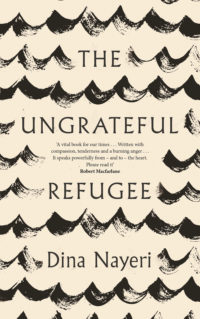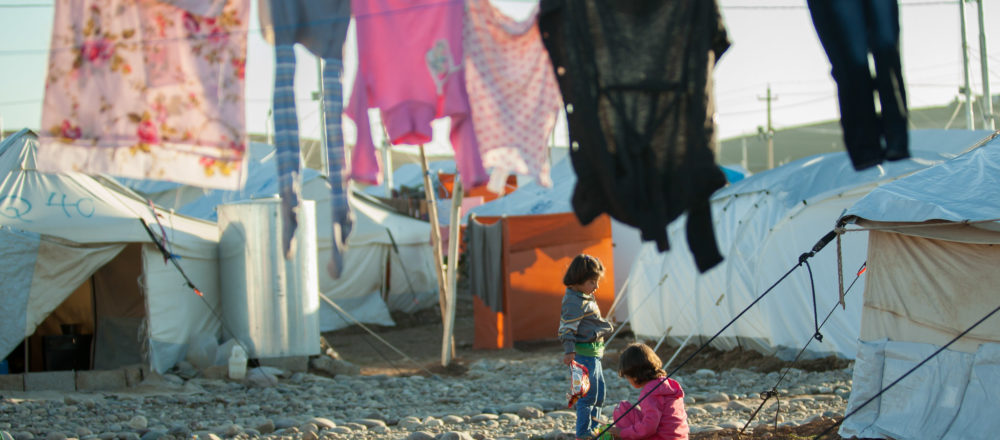
The Ungrateful Refugee
Dina Nayeri
Allen & Unwin
“Without a country,” Dina Nayeri writes, “a fire is quenched, another flares. Limbo is temptation itself – the itch to make life happen.”
Weaving memoir with the stories of other refugees, Nayeri’s latest book, The Ungrateful Refugee, explores what it means to be a refugee today, to reconcile your place in an increasingly hostile world. Nayeri left Iran as a refugee at ten years old with her mother and brother. They stayed at a temporary refugee camp in Italy before eventually resettling in America.
She writes of the frustration of waiting living in the camp: “In the absence of work or school, all we did was dream, a maddening state, and battle loneliness.” Waiting, as the ultimate indignity or ultimate power to impose, becomes a key theme in the book.
The inhumanity of governments, Nayeri writes, is imposed waiting, to “force refugees into cement shoes and tell them now you have roots.” The granting of temporary protection that lasts 1, 2, 3 years, is life in between life. There is no safety, no security, no ability to establish home. This is the difference between charity and welcome.
Nayeri recounts a memory at a church in Oklahoma soon after arriving in America, when a woman reasoned, “Well, I sure do get it. You came for a better life.”
“A better life?” she writes. “In Ifashan, we had yellow spray roses, a pool. A glass enclosure shot up through our living room and inside that was a tree. I had a tree inside my house…life in Iran was a fairytale.”
In Oklahoma, her family share a tiny, squalid apartment in a rough neighbourhood, yet still have to spend every day of their new lives differentiating themselves from economic, opportunistic migrants.
The right of asylum used to be a universally accepted and recognised right. Yet as the rhetoric of swarms and floods permeates politics and much of mainstream media, this right is increasingly having to be justified by those fleeing life-threatening circumstances. The vast majority of refugees enter neighbouring countries or those in close proximity, yet the West is still under the impression that our borders are facing a crisis.
Furthermore, once the refugee has established themselves as genuine, a whole range of expectations are imposed upon them. We expect them to be grateful. We expect them to assimilate as soon as they have landed on our soil. We expect them to be productive, yet never to surpass us.
Nayeri is lucky. She works hard and managed to escape her circumstances, attending a prestigious University, getting married, landing a good job. For these reasons, Nayeri initially questions why she continues to return to refugee camps, to sites of detention and waiting, to states of limbo when she now has a home, a passport, a family. She decides:
“I’ve come because the world is turning its back on refugees, because America is no longer America and Europe is going the same way: these once Christian nations have abandoned duty in favour of entitlement and tribal instinct. I’m here because I have a skill, borne out of my idle refugee days. I’ve watched people when they’re ordered to do nothing and I know just how life reasserts itself, like that first bubble in still water before the whole pot comes to boil. I’m here to make a few stories leap out from the tepid simmer of information and to carry those stories to the West, a mother who once adopted us, the exiles and outcasts and now needs us to intervene as callouses harden fast around her heart.”
Nayeri does make these stories come to life. The refugees she writes of are not faceless statistics to fear, nor helpless victims lacking agency. Rather, Nayeri paints a picture of families who maintain their dignity living in a wasteland, who decorate their spaces in refugee camps and gather their rations to make lemon cake, to come together, to form ties.
She tells stories of success, refugees who become doctors, who work hard and succeed, and stories of missed opportunities, the desperation of those who never got a chance. This desperation surpasses linguistics. Nayeri writes that these people were not merely asylum seekers, politely seeking, they were “ravenous for it, this creature need for the safety of our bodies.”
The need for safety is not just the desire for acceptance, but for home. What is home, and how it is established, runs as a current underneath Nayeri’s story. Is home the house we grew up in? Our loved ones? The place we live in now? Or is it emotive, a feeling, whether one of refuge and safety or nostalgia, yearning and fear.
Academic David Morley writes that to live in a home, one needs to be “accepted, welcome or at least tolerated.” For the internally displaced, the idea of home as fixed is problematised, contradictory, and must be renegotiated.
Nayeri writes that the longing for return begins the moment the refugee settles in their host country. In China there is a phrase to describe this feeling, “fallen leaves return to the roots.” Though the exile never ends, the refugee is left to endlessly wander. Yet, Nayeri finds, they do settle and take root, “only in each other, planting ourselves like roses at each others houses.”
The Ungrateful Refugee, in magical prose, delivers a powerful, human reflection on the state of refugees today, the burden of gratitude, and of hope.



